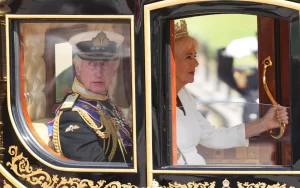King Charles has presented Sir Keir Starmer’s comprehensive plan for Britain, featuring proposed laws on planning reform, employment rights, and transport.
Here’s a detailed breakdown of the King’s Speech, highlighting both included measures and notable omissions.
Border security
The new Border Security, Asylum and Immigration Bill empowers the Border Security Command with counter-terrorism-style authority to dismantle people-smuggling gangs. Tougher penalties will target those advertising smuggling services or providing materials to criminal gangs. Funding will come from the abolition of the Rwanda deportation scheme, saving £100 million in future payments and additional costs.
The bill aims to clear the backlog of asylum claims, including 90,000 migrants earmarked for Rwanda, and end hotel use for housing asylum seekers.
Equality
The Equality Bill will align race with sex in equal pay claims, promoting a more equal society and supporting economic growth. Ethnic minorities and disabled people will gain a “full right to equal pay,” simplifying claims against employers by eliminating the need to prove direct discrimination.
Renters’ rights
A Renters’ Rights Bill will abolish Section 21 “no-fault evictions” and empower tenants to challenge unreasonable rent increases. It will combat “bidding wars,” extend Awaab’s Law to the private sector, and enforce a “decent homes standard.” The bill will also prohibit discrimination against tenants receiving benefits or those with children, streamline dispute resolutions, and create a digital database for landlords, tenants, and councils.
Crime and policing
Respect orders will provide police with new tools to address anti-social behaviour, with breaches punishable by imprisonment or fines. The Crime and Policing Bill will enable rapid action against noisy dirt bikes, deploy 13,000 additional neighbourhood police officers and PCSOs, and make assaulting a shop worker a specific offence. It will also close loopholes related to ninja and samurai swords, with tech executives facing jail if banned weapons are sold on their platforms.
Martyn’s Law under the Terrorism Bill will mandate preventative measures against terror attacks in public premises. The Victims’ Bill will ensure offenders attend sentencing and impose restrictions on name changes for sex offenders.
Education
The Children’s Wellbeing Bill will introduce free breakfast clubs in primary schools, limit mandatory branded uniform items, and require academies to teach the national curriculum. New requirements for teacher qualifications, enhanced powers for Ofsted, and strengthened safeguarding provisions will also be enacted. Skills England will be established to address national skills needs.
Planning
The Planning and Infrastructure Bill aims to expedite the planning process to build 1.5 million homes by 2029, reform compulsory purchase rules, modernise planning committees, and streamline infrastructure approval processes.
Workers’ rights
An Employment Rights Bill will increase the minimum wage, ban exploitative zero-hour contracts, end “fire and rehire” practices, and extend flexible working from day one. The bill will repeal post-2010 Tory trade union legislation, extend benefits like parental leave and sick pay from day one, and introduce a “fair pay agreement” for the adult social care sector.
Transport
The Passenger Railway Services (Public Ownership) Bill will nationalise rail companies as contracts expire or if they fail customers, without compensation. Great British Railways will be established to manage the network, simplify ticketing, and automate compensation for delays. The High Speed Rail (Crewe to Manchester) Bill will enhance northern train lines without reversing the cancellation of the HS2 leg to Manchester. The Better Buses Bill will empower councils to launch publicly owned bus companies and mandate route provisions.
Economy
A Budget Responsibility Bill will introduce a “fiscal lock” for independent Budget assessments by the Office for Budget Responsibility. The National Wealth Fund Bill will establish a £7.3 billion fund for growth projects, incorporating the British Business Bank and the UK Infrastructure Bank. A Bank Resolution (Recapitalisation) Bill will enhance support for small banks and expand the Financial Services Compensation Scheme.
Companies
The Arbitration Bill will streamline dispute resolution between firms, and the Product Safety and Metrology Bill will reform product regulation, focusing on AI opportunities and e-bike safety. A draft Audit Reform and Corporate Governance Bill will ensure truthful financial reporting.
Pensions
The Pension Schemes Bill will increase the withdrawal amount for private pensions, consolidate pension pots, and ensure trust-based schemes deliver value for money. Terminally ill individuals will access funds earlier.
Football
The Football Governance Bill will introduce an independent regulator for financial stability, licensing professional clubs, and restricting changes to club assets and league memberships.
Health
Labour’s Tobacco and Vapes Bill will implement a progressive smoking ban for those born after 2009, regulate vape marketing to children, and introduce measures to prevent the next generation from becoming nicotine-dependent.
Conversion therapy
The Conversion Practices Bill will introduce a comprehensive ban on conversion therapy, ensuring protection while allowing legitimate psychological support.
Palestine
The King reaffirmed Labour’s commitment to a two-state solution in the Middle East, with a secure Israel alongside a viable Palestinian state.
Private schools
Labour’s plan to impose VAT on private school fees will feature in the next Budget, funding the hiring of 6,500 new teachers.
Omissions
Notably absent from the King’s Speech were measures for a Lords’ retirement age, lowering the voting age to 16, and scrapping the two-child benefit cap, despite pressures from campaigners and potential backbench revolts.
Read more:
Starmer’s vision for Britain: key pledges and missing pieces from the King’s Speech

